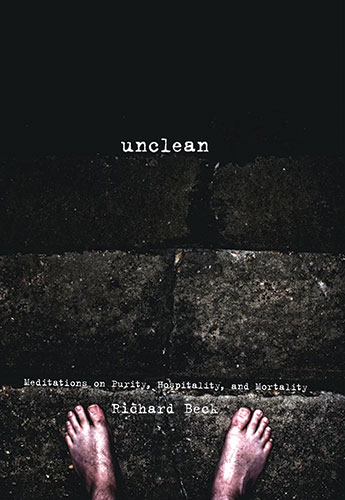“Imagine spitting into a Dixie cup. After doing so, how would you feel if you were asked to drink the contents of the cup?” This is the opening image used by Richard Beck in Unclean to explore the relationship between disgust and morality.
Disgust is a universal cultural expression. Human beings appear to be conditioned to be repulsed by particular expressions and practices around what enters and exits our bodies. Disgust is one way of monitoring the body’s boundary. Closely related are categories of purity and contamination. Think of a glass of water into which a drop of urine is added. Can you even think about it? Even if the water is subsequently boiled and filtered, many would not want to drink it. Any trace of certain contaminants can render something unclean in our minds.
In Unclean, Beck demonstrates how humans project this psychological function into social settings. Countries, cultures and churches also work with notions of purity and contamination, often directly related to morality. They create close links between evil and disgust. This can be as simple as looking down on someone not properly dressed for church or as severe as outbursts of genocide.
In response to this reality, Beck explores Jesus’ quote from the prophets that God desires mercy and not sacrifice. Beck reads this as a move away from the holiness tradition of the Hebrew Bible, which appeals to the boundary-keeping categories of purity, contamination and disgust. Beck writes that in this area the prophetic and the priestly traditions contradict each other, and there can be no way of affirming both. To the extent that the church functions with a purity/holiness model, it will continue to reject and exclude people from fellowship.
Beck argues that Jesus reverses the traditional understanding of contamination. Jesus is not concerned with being contaminated; rather, Jesus desires to extend holiness, what Beck terms a “positive contamination.”
Beck concludes that the church needs to confront the damaging images of purity and holiness that are based on this disgust psychology. It overcomes its disgust-based morality by extending the image of love and by increasing our vulnerability, so that mechanisms of disgust are slowly dismantled.
When we love, we become more comfortable, more at home with one another. Boundaries then become aligned not with some ideal of holiness, but with a way of helping one another relate to Christ and to each other. A central image for Beck is the Eucharist, in which body, which we implicitly try to patrol; hospitality, the act of inviting someone across our boundary; and purity, the call to live in the presence of God, are all brought together.
I have some criticisms of this book. Beck’s biblical exegesis on holiness is not consistent enough in terms of the interplay between prophetic and priestly traditions of holiness. The Bible does not set them up in the neat opposition that Beck suggests. Neither does Beck give enough attention to the positive contamination of Jesus.
In spite of these minor criticisms, I highly recommend the book for churches wanting to be “holy,” and especially for churches addressing topics of human sexuality where we can be prone to categories of purity, contamination and disgust. We will need to ask ourselves whether we can recognize and acknowledge when we have been seeking sacrifice and not mercy.
David Driedger is associate pastor of First Mennonite Church, Winnipeg.








Leave a Reply
You must be logged in to post a comment.